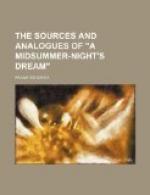They liked his gold so well,
That they were both content,
That he that night with his sweetheart
Should pass in merriment.
To bed they then did go;
Full well he knew his part,
Where he with words, and eke with deeds,
Did buss his own sweetheart.
Long were they not in bed,
But one knocked at the door,
And said, Up, rise, and let me in:
This vexed both knave and
whore.
He being sore perplexed
From bed did lightly start;
No longer then could he endure
To buss his own sweetheart.
With tender steps he trod,
To see if he could spy
The man that did him so molest;
Which he with heavy eye
Had soon beheld, and said,
Alas! my own sweetheart,
I now do doubt, if e’er we buss,
It must be in a cart.
At last the bawd arose
And opened the door,
And saw Discretion cloth’d in rug,
Whose office hates a whore.
He mounted up the stairs,
Being cunning in his art;
With little search at last he found
My youth and his sweetheart.
He having wit at will,
Unto them both did say,
I will not hear them speak one word
Watchmen, with them away!
And cause they loved so well
’Tis pity they should
part.
Away with them to new Bride-well;
There buss your own sweetheart.
His will it was fulfilled,
And there they had the law;
And whilst that they did nimbly spin,
The hemp he needs must taw.
He ground, he thumped, he grew
So cunning in his art,
He learnt the trade of beating hemp
By bussing his sweetheart.
But yet, he still would say,
If I could get release
To see strange fashions I’ll give
o’er,
And henceforth live in peace,
The town where I was bred,
And think by my desart
To come no more into this place
For bussing my sweetheart.
They all liked his song very well, and said that the young man had but ill-luck. Thus continued he playing and singing songs till candle-light: then he began to play his merry tricks in this manner. First he put out the candles, and then, being dark, he struck the men good boxes on the ears: they, thinking it had been those that did sit next them, fell a-fighting one with the other; so that there was not one of them but had either a broken head or a bloody nose. At this Robin laughed heartily. The women did not escape him, for the handsomest he kissed; the other he pinched, and made them scratch one the other, as if they had been cats. Candles being lighted again, they all were friends, and fell again to dancing, and after to supper.
Supper being ended, a great posset was brought forth: at this Robin Good-fellow’s teeth did water, for it looked so lovely that he could not keep from it. To attain to his wish, he did turn himself into a bear: both men and women (seeing a bear amongst them) ran away, and left the whole posset to Robin Good-fellow. He quickly made an end of it, and went away without his money; for the sport he had was better to him than any money whatsoever. The fear that the guests were in did cause such a smell, that the bridegroom did call for perfumes; and instead of a posset, he was fain to make use of cold beer.




